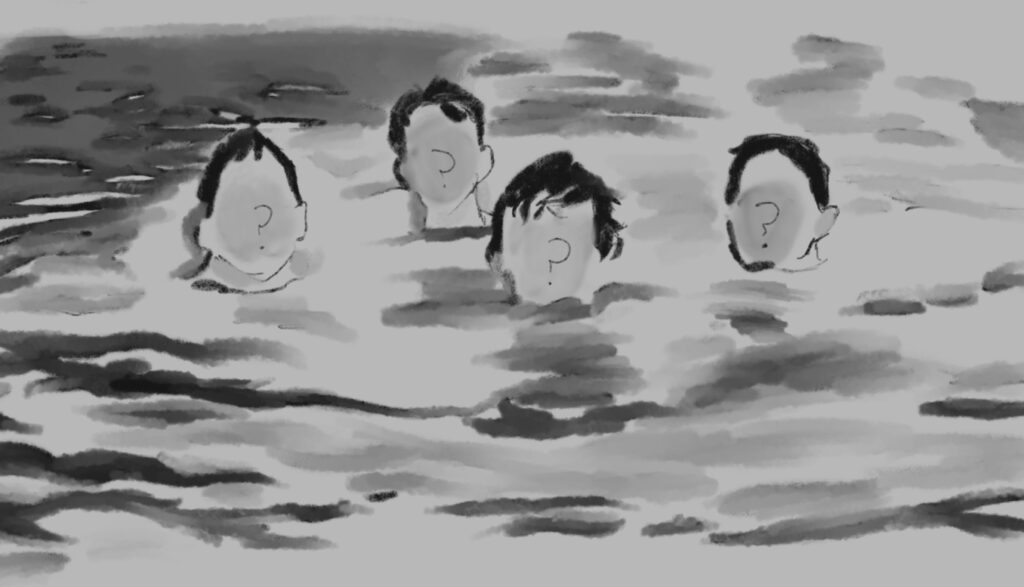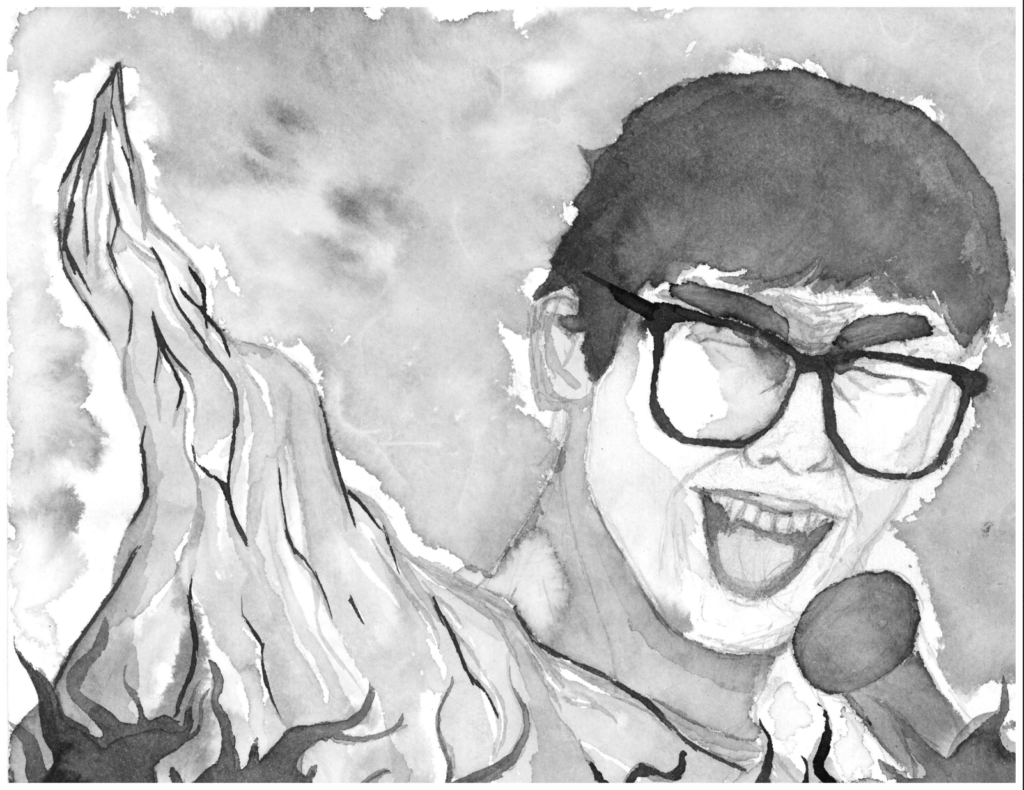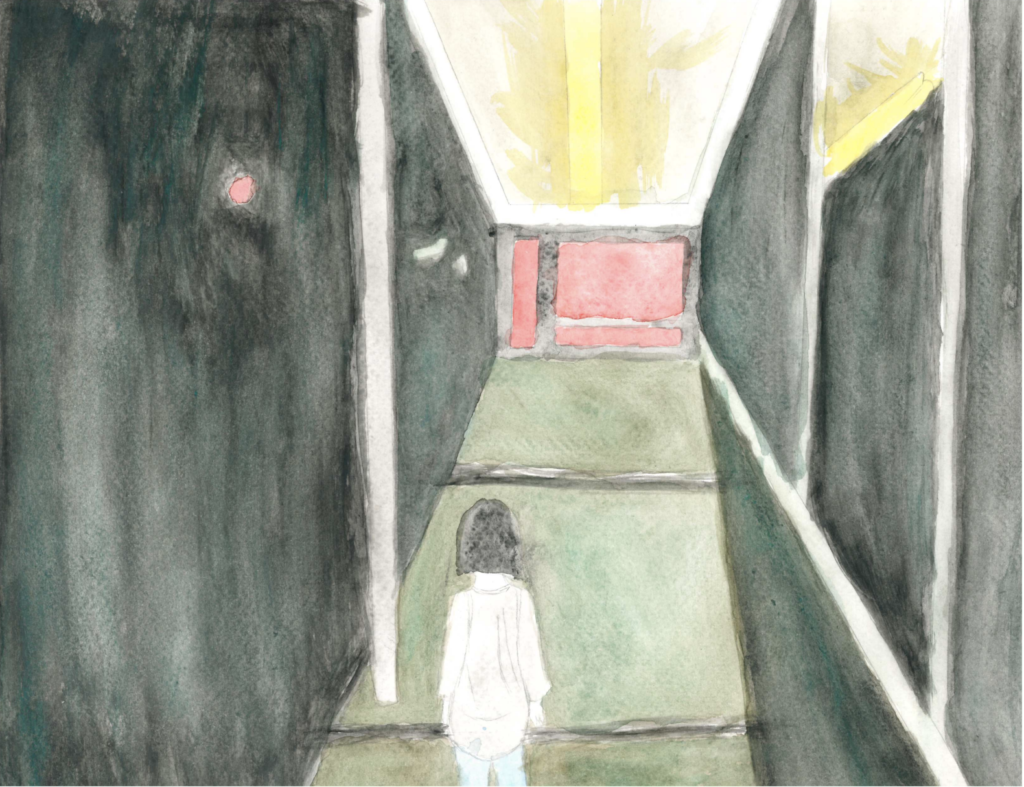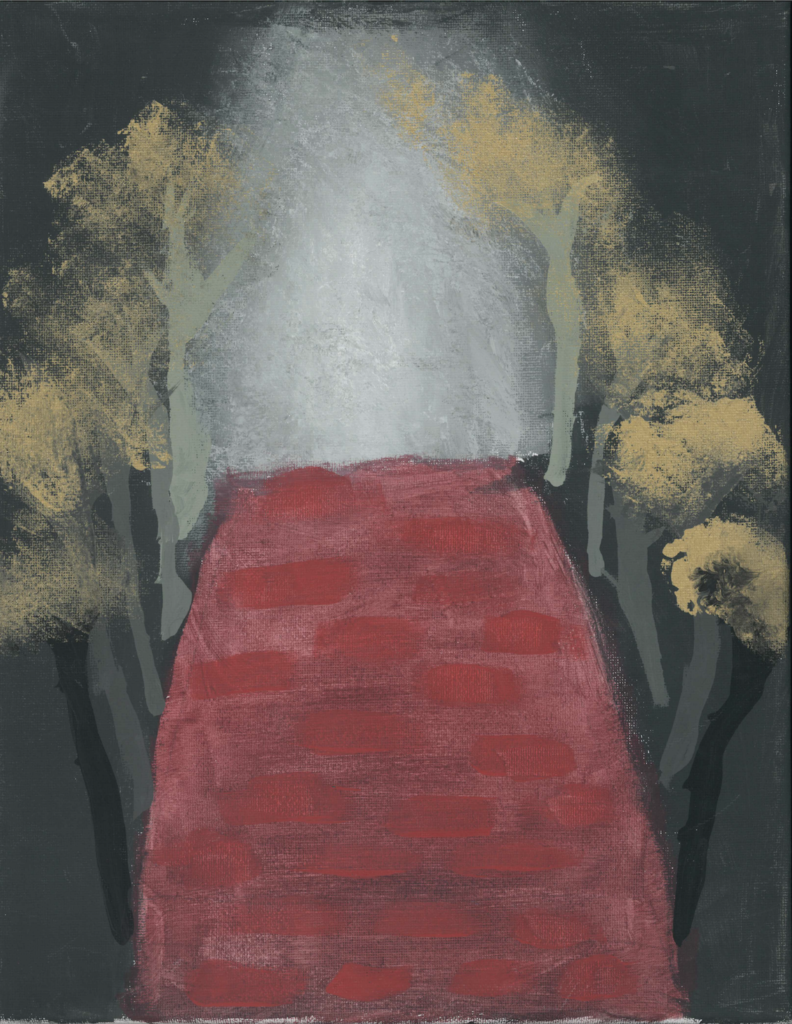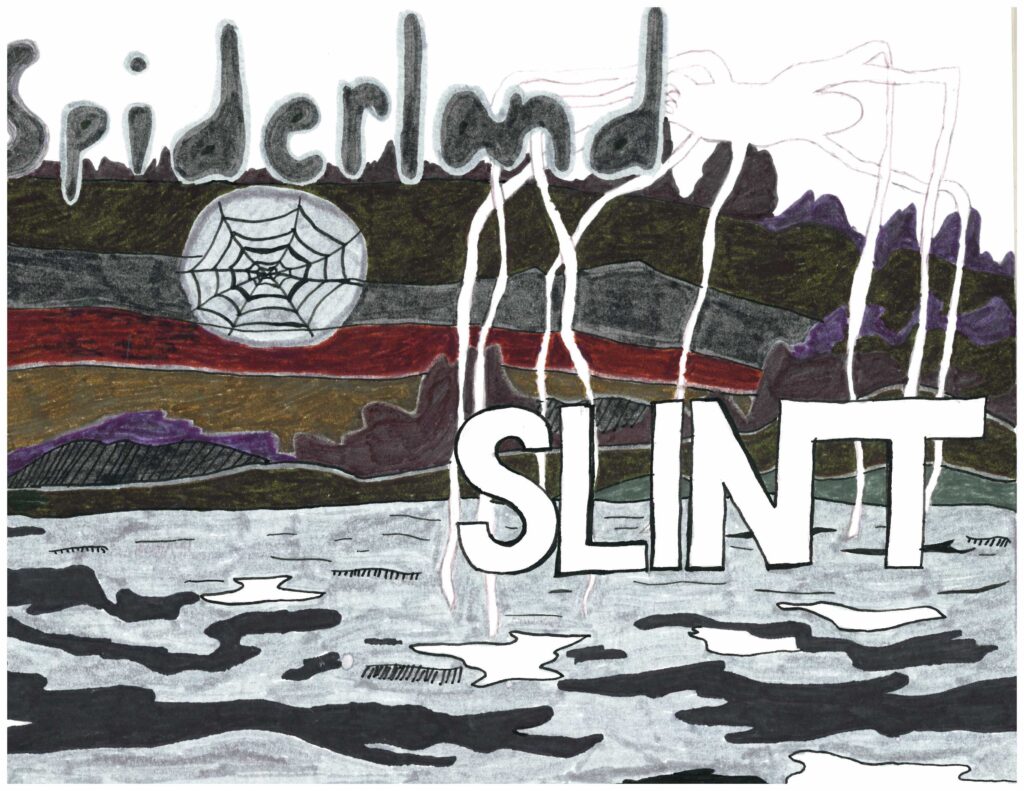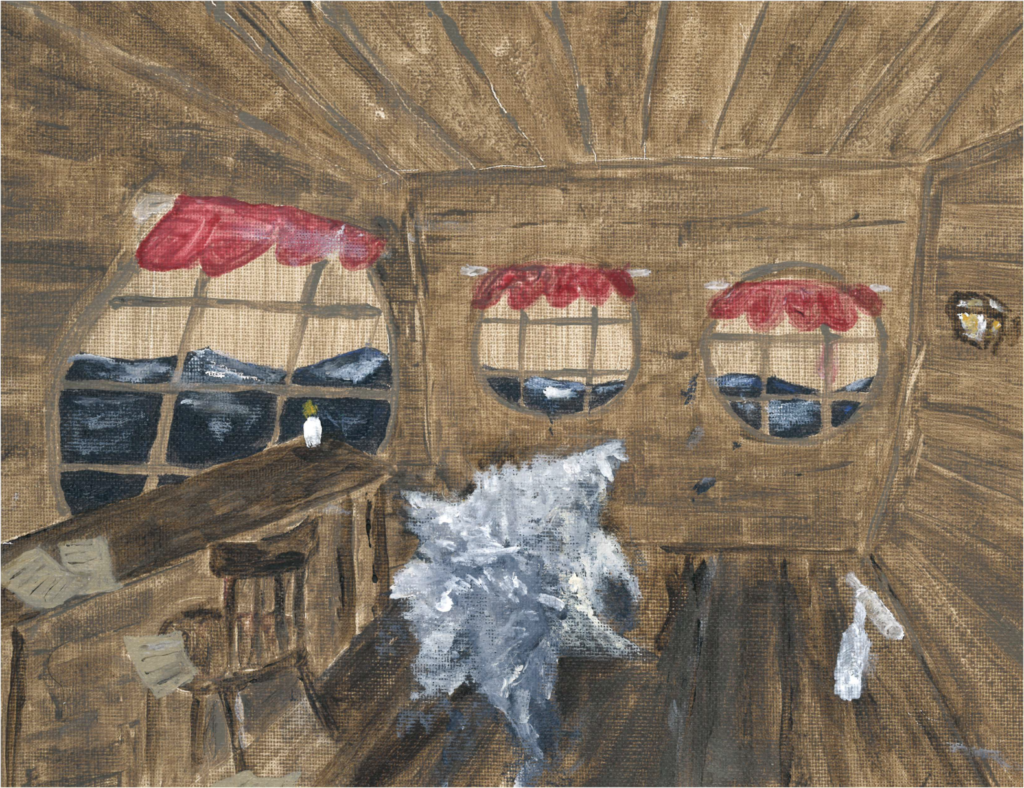Slint’s Spiderland is a moody, entrancing post-punk work of art. It combines dissonant guitar melodies with unique time signatures like the 7/4 into 12/8 and 15/8. The lyrics talk of complex feelings of desolation, relationships, and an overarching theme of youth that speaks to its generation. Below is an analysis of the six songs from Spiderland, along with accompanying art inspired by the album. – Mayumi Schreiber
Breadcrumb Trail (Words: Will Barr, Art: Ryan Stenson)
“Breadcrumb Trail” is an oddly poetic song, the spoken word enhances this. Fortune telling is an esoteric practice that I believe appealed to Slint because of its profound irrationality. I do not say this negatively, merely, a more intuitive and less refined emotion is the driving force behind fortune teller and like the instrumentation this creates a more arcane and intuitive feeling. There is a lot of tension between the singer and the girl reading his fortune, perhaps between the singer and his fortune as well. We are never told his fortune, merely the world seems to widen with the lyrics “I shouted and searched the sky for a friend.” The end of this song leaves questions unanswered and emotions unresolved. I can’t help but wonder if the singer and fortune teller never crossed paths in the future and their respective existences were relegated to memory.
Nosferatu Man (Words: Will Barr, Art: Clara Kornelis)
“Nosferatu Man” is one of my favorite songs on the album. The driving dissonant guitar and quiet spoken lyrics remind me of The Doors if they had a more edge and appreciation for paranormal. This is very explicitly a vampiric song, and the high pitched guitar melody has an almost batlike quality to it, as if bat flutters throughout the light. The repetition likewise mirrors the gray agelessness a vampire would face. The riff is almost mundane, but this forces you to think very hard about the riff, as you drift into a trance. Dissonant music is difficult to pull off, but Slint creates a dissonance that draws you in, enrapturing you, the listener, in their weird, wonderful, horrific, fantasy. The woman in the lyrics, giving in to her vampiric lover’s seduction is a dark twist. The vampire seems not entirely displeased with this.
Don, A Man (Words: Mayumi Schreiber, Art: Lulu Tonisson)
According to Britt Walford in an interview with FACT Magazine, “Don, Aman” is about a guy at a party who promptly goes outside to “get back in touch with himself” due to the discomfort he feels in the room. The opening line “Don stepped outside” is a spine chiller. The song to me describes a more complex feeling of loneliness than the literal physical loneliness which is occurring in the first section of the song: “Don stepped outside/ It felt good to be alone.” While sure, the song literally expresses Don’s relief to be out and away from the party, it follows with several expressions of feeling out of place or a lack of belonging. It touches on an advanced idea of being alone in a room full of people. The whole song feels airtight and suffocating, it’s tense and ominous. Eventually, Don takes a deep breath and allows himself to go back into the party, a momentous step since earlier he was so wrapped up in his ideas and perceptions of his sociability that he couldn’t even pee, “He thought about something he just said/ And how stupid it had sounded/ He really tried to forget about it/ And he decided to piss, but he couldn’t.”
“The light/ Their backs/ Their conversation/ Their couples, romancing, so natural.” Don’s out of place-ness and desolation in the midst of a party is furthered with this line. For the most part, he’s only seeing the backs of people who are engaged in interaction with each other but not at all with him. He even notices typical types of couples at the party, hookups and flirting, and he notices how natural it comes to everyone else while he feels alienated even outside of a romantic context. Once he finally finds his friends we’re introduced to a haunting type of dystopian visual. An uncanny type of coldness and gaze coming from those who we can presume Don is closest to in this instance, “His friends stare/ With eyes like the heads of nails.” Don never really gets any relief after he comes back into the house. He has an internal watcher who tells him that he doesn’t belong and that everyone else around him is watching him too and feels the same way.
Don in the third act of the song finally frees himself from the party which while it gives us as the listener a type of relief also evokes a strong feeling of defeat. Don is an unreliable narrator and we don’t know if the contempt or malice he thinks those around him hold against him is real or a manifestation of a possible case of social anxiety. We’re then transported to the morning after in the final verse: “Don woke up/ And looked at the night before/ He knew what he had to do/ He was responsible/ In the mirror/ He saw his friend.” In this moment, Don suddenly recognizes himself as his only friend and retires himself of the burden of social obligation. This may even play with themes of suicide as touched on in the following track, “Washer.”
Washer (Words: Mayumi Schreiber, Art: Eli Swartley)
This lengthy heart-wrenching track is not only a breakup song but a suicide note as told through talk of an “eternal dreamless sleep.” The song opens with our narrator saying goodnight to his lover: “Goodnight my love/ Remember me as you fall asleep.” The somber tone of it though cries of permanence and fatalism. This fatalism is then enforced in the next verse with the line “I won’t be back here/ Though we may meet again.” In my opinion one of the most beautiful and complex lines in this song appears at the end of the third verse: “Wash yourself in your tears/ And build your church/ On the strength of your faith.” The religious imagery implies a sort of baptism where in this instance I think that the lover is being asked to cleanse themself of the narrator. Whatever ideas or sense of faith they feel toward the narrator must go because they are better off without him. This reminds me a lot of the statement in John Lennon’s “Jealous Guy” due to an acknowledgment of insecurity and wrongs especially toward the women in his life.
The line which follows this though adds a complexity due to a slight contradiction. While the whole song screams of permanence and a final goodbye as well as cleansing, he also begs for faith to not be fully lost, that he will rise again, eventually improved and in better condition. This better state could also be interpreted as a release from the burdens of life and that his only solace is in death. “Don’t let go/ Don’t let this desperate moonlight leave me/ With your empty pillow/ Promise me the sun will rise again.”
The song ends with the final goodbye and even a little bit of what happens after. “I too am tired now/ Embracing thoughts of endless sleep/ My head is empty/ My toes are warm/ I am safe from harm.” This solidifies no reuniting in the future, not only is he leaving his lover but he is leaving the mortal plane altogether. This is followed by a morbid but also hauntingly euphoric set of lyrics. Besides the dark physical implications of what has happened to his body based on the idea of an empty head and warm toes which could be about blood reaching the toes after being shot in the head or the hypersensitive nerves that occur during death by hanging until they become completely senseless, we are delivered the ecstasy of a free mind. While the closing, “I am safe from harm” is ironic in a literal sense, to our narrator he is now safe from the metaphysical emotional harm and burden that comes with living.
For Dinner (Words: Will Barr, Art: Rylan Holmes-Shields)
“For Dinner” is bizarre. It is not psychedelic, so much as delirious. The musical color palette that Slint chose from, included a diverse and contrastive array of shades of sounds- but they are more interested in darker, more shameful and negative emotions than of any psychedelic ecstasy. The bass permeates, and becomes almost unnoticeable before picking up softly but intentionally. This is a trance, a pagan ritual that merely takes the form of sound. There is intensity that builds as the dynamics change, the guitar becoming faster or slower, grating or softer. The bass is central here, as the backbone on which the muscles and tendons of the guitar and drums build flesh and skin and structure to the music. This music is beautiful as it is dark, not quite evil, but dangerous. I hesitate to assign ethical judgements to the sounds of music, but this song sounds like it is making an ethical statement.
Good Morning, Captain (Words: Mayumi Schreiber, Art: Rose Veneklase)
“Good Morning, Captain” really ties up the coming-of-age narrative that appears in a couple of the tracks on the album. Through the metaphor of a sea captain who is the only one left after a brutal storm, Brian McMahan aims to express the feeling of loss when transitioning to adulthood and saying goodbye to adolescence. While almost all of the songs before this one strongly have a sense of youth, this is the conclusion to that. It even utilizes the ship motif that also appears in the opening song “Breadcrumb Trail” in the line “Scattered remnants of the ship could be seen in the distance.” The idea of growing up and leaving things behind is even literally affirmed toward the end of the track when McMahan says, “I miss you/ I’ve grown taller now.”
There is even a tie between the sense of isolation that appears in “Don, Aman.” “‘I’m the only one left/ The storm took them all.’” While our narrator is still clinging so desperately to childhood and not wanting to let go of all of these things he’s held dear to him, his friends have already moved on. He is the last one on the shore.
“The captain reached for something to hold on to/ ‘Help me,’ he whispered, as he rose slowly to his feet/ The boy’s face went pale/ He recognized the sound.” This line is incredibly intriguing because of the different ways it can be interpreted. At first glance, you could suggest that the captain is trying to reach out to his youth represented by the boy but it denies him that pleasure because he has already been too tarnished to return. This is also reminiscent of the theme of the idea that knowledge comes with a nihilism or cynical view which we’ve seen in “Don, Aman” when our narrator solidifies his loneliness choosing then on to reject society. On the other hand, McMahan brings up that the following verse is actually about his little brother. It’s an apology for leaving him behind to grow up in Louisville and experience the same tough coming-of-age that McMahan did. The boy could also be a representation of a festering fear of losing his younger brother or even just the idea that he has left him and can’t undo that fact. This apology is evocative and chilling. “I’m sorry, I miss you.”

